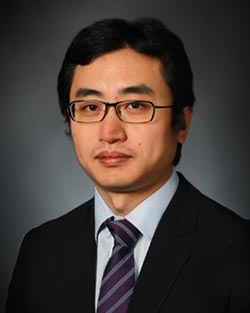Kifer, Zhang receive Outstanding Paper Award
11/09/2018
UNIVERSITY PARK, Pa. – Daniel Kifer, associate professor of computer science and engineering, and Danfeng Zhang, assistant professor of computer science and engineering, received an Outstanding Paper Award at the Conference on Computer and Communications Security (CCS) hosted by the Association for Computer Machinery (ACM). Their paper, “Toward Detecting Violations of Differential Privacy,” was one of only two papers at the conference to receive this prestigious recognition.
The paper was coauthored by Zeyu Ding and Yuxin Wang, both Penn State graduate students, and by Guanhong Wang, a Penn State undergraduate student.
According to the Association for Computing Machinery’s website, this award is presented to “authors whose work represents groundbreaking research in their respective areas” that will “likely shape the future of computing.”
“The Department of Computer Science and Engineering and the School of Electrical Engineering and Computer Science are proud to have stellar researchers like Dr. Kifer and Dr. Zhang,” said Chita Das, department head of computer science and engineering. “The Outstanding Paper Award that they received for their research on differential privacy is very well deserved.”
Kifer and Zhang’s paper discusses their development of a method to detect bugs in algorithms created for protecting privacy. Specifically, their research focused on differentially private algorithms used for statistical disclosure control. Differential privacy is a methodology for modifying data collected from users so that the result is statistically relevant and protects the user’s confidentiality.
Differential privacy technology is being used by Google and Apple to collect aggregate data about their users without sending personal information to their servers and without linking data to any particular user. It also is currently being adopted by the U.S. Census Bureau to protect responses for the upcoming decennial census.
However, many algorithms used for these purposes have bugs that compromise user privacy. Kifer and Zhang have developed a technique for identifying violations of differential privacy that allows a developer to “quickly explore variations of an algorithm and investigate where they break down,” according to their paper.
The full paper can be found in ACM’s digital library.





